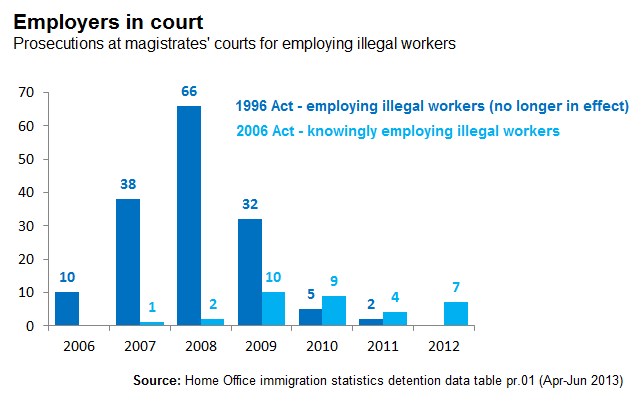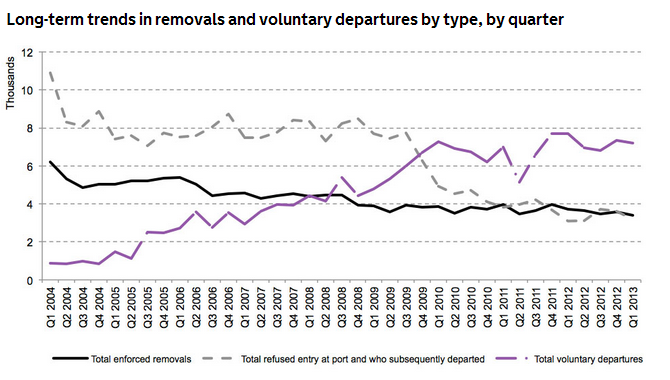Fewer prosecutions for employers of illegal migrant workers: a good or bad sign?
"At a time of economic insecurity, many people's greatest concern is whether immigration is being exploited to keep wages down or jobs scarce ... the number of prosecutions for employing illegal migrants has halved since the election"
Yvette Cooper, Labour Conference 2013
Labour has made the enforcement of workers' rights a key theme of its home affairs and employment policy. Already this year we've seen Chris Bryant, shadow immigration minister, accurately point out there have been no prosecutions for firms failing to pay the minimum wage, and estimates of the number of workers paid below the standard range from 300,000 upwards.
This week, shadow home secretary Yvette Cooper added a new line of attack, pointing out that fewer employers are being prosecuted for employing illegal migrants under the Coalition government.
Employers can be fined up to £10,000 per worker if they're found to have illegal migrants working for them, although the Coalition want to increase this to £20,000. People used to be convicted under the Asylum and Immigration Act 1996, but sections of this have since been repealed. Individuals can now be sent to prison for up to two years if they 'knowingly' employ illegals under the Immigration, Asylum and Nationality Act 2006.
She's right to point out prosecutions have halved. The Home Office records prosecutions and convictions for firms that employ migrants illegally as part of its immigration statistics every three months. The figures show 14 cases brought to magistrates' courts under the two acts in 2010 compared to 7 in 2012.
But looking at the trend over a longer period of time suggests there's a less obvious reason which explains the drop:

While those prosecuted under the 2006 act (those knowingly employing illegal workers) have followed an unremarkable trend since the Act's offences came into force in 2008, prosecutions under the 1996 Act have fallen off considerably since their peak following the repeal of new offences under the Act.
So prosecutions for employing illegal workers under these acts fell much faster under the last years of the previous Labour government thanks to their own 2006 Act.
Arrests have also fallen more recently, down from a 2008 peak of 5,800 to 3,900 in 2011 (no figures for 2012 yet).
Why? The government's line is that its tactics have changed. In response to a recent parliamentary question it explained why arrests in the first place had gone down:
"The number of arrests made as a result of illegal working enforcement visits, has reduced due to a tactical decision concerning where to target suspected immigration offenders and due to an expansion of the types of activity conducted by enforcement teams, increasing numbers of illegal immigrants have left the UK over the same period."
That means, as the Home Office explains, targeting suspected offenders at their homes rather than at their workplaces and as well "complex operational activity against individuals of significance who have committed high harm activity". The government don't translate the jargon.
In any case the answer references more Home Office figures on voluntary departures, which is where people who don't have a right to remain can arrange for their own departure. It's true that more people are leaving the UK in this way as a long-term trend, but enforced removals (including deportations) show a trend in the opposite direction.

A promising trend or evidence of failure?
There are no prizes for guessing which side of this fence the shadow home secretary's on. But in fact neither side really produces the evidence to prove its case.
It's all very well for the Home Office to claim that "employers' increased awareness of the regime together with improved guidance on the UK Border Agency website" is a reason for fewer prosecutions, but it's impossible to quantify the extent to which this explains the reduction.
At the same time, simply appealing to a reduction in prosecution figures doesn't prove or disprove that more employers are 'getting away with it' when it comes to hiring illegal workers. It's not that Yvette Cooper is alone, however: there aren't any estimates we've seen for the illegal worker population of the UK. The closest examples only look at the total illegal population, said to be between 400,000 and 900,000, but these aren't necessarily very reliable, let alone provided as trends over time.